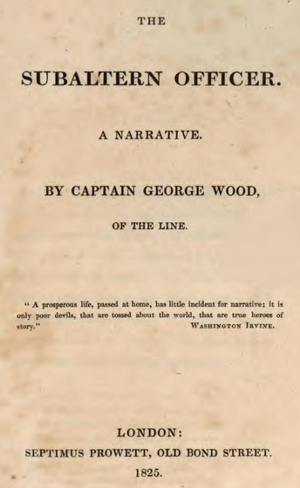Topic: Officers
The Subaltern's Experience:
Early Days with a Regiment
Excerpted from The Subaltern Officer: A Narrative
By: Captain James Wood, of the Line
(1825)
 We set off on our march for Derby, where we were stationed some time. Here I still practised the same extravagance as before—spending "half a crown out of sixpence a-day;" but this excess could not last long. I had been in this town only about a month, when an order arrived for a Captain, two Subalterns, and one hundred men, to join the first Battalion, which, was then at Cork, forthwith.
We set off on our march for Derby, where we were stationed some time. Here I still practised the same extravagance as before—spending "half a crown out of sixpence a-day;" but this excess could not last long. I had been in this town only about a month, when an order arrived for a Captain, two Subalterns, and one hundred men, to join the first Battalion, which, was then at Cork, forthwith.
I must here notice a circumstance which had nearly blasted my future prospects in the Army. Some malicious person, by way, I suppose, of ingratiating himself with the Commanding Officer, informed him I had designated him an old fool; and, to my great astonishment, being quite innocent of the charge, I was summoned before a Court of Inquiry, to have this weighty matter investigated; when, by the state ment of the gentlemen who were present at the time this improper expression was said to have been uttered, I was fully cleared from the imputation. The occur rence, however, was of service to me; as I learned, that had the epithet been used, however justly applied, the consequences to me would have been serious.
To return to the subject: among the Officers ap pointed to accompany this detachment, I was included —and a very pleasant situation I was in, truly: a march of about two hundred miles before me, without any money in my purse, and about thirty pounds in debt to the tradesmen of the town:—but there was now no time to lose, and upon informing my creditors that they should be paid as soon as I arrived at my destination, they very kindly agreed to this arrangement. We set off the next morning, with only sixpence between my brother Sub and myself, which we shared in a glass of ale on the march, wishing each other better luck and more prudence in future. We trudged on, meditating and moralizing on our late extravagance; for in general ot it only necessity that reminds us of our folly.
For the sake of some of my young military readers, I hope to be excused for pursuing for pursuing this topic a little farther. On a young gentleman's joining a regiment, he is too apt to be dazzled by the new life of apparent pleasure that he is about to lead but, if his fortune be limited, the greatest care and economy are requisite. The utmost circumspection, too, is required in his conduct, especially at the mess-table, where the want of politeness, good address, and propriety of speaking on his first appearance, is often lastingly attended with the most unpleasant consequences. A deficiency in these qualifications will not fail to impress his asso ciates with an unfavourable opinion of him; and according to the impression made, will he be subject to be treated till that impression is removed, which, in many instances, is not the case during the time of his remaining in the regiment. It may be supposed that no gentlemen enter the Army without these previous acquirements; but admitting this to be the case, they cannot have that experience which their seniors have gained by long habits of military decorum and observation. It is, therefore, particularly displeasing to see these young men officious, talkative, presump tuous, and conceited, which, unfortunately, is too often the case. They should have the modesty, how ever clever they may be, to keep reserved ; and for two or three years employ themselves in the study of men and manners, which they will find one of incalculable benefit. Be it observed, that I am not one of those tyrants who say that Subalterns should not be allowed even to think; nor do I mean to insinuate that they are not to join in the convivial conversation and merriment of the jovial companions with whom they associate — I only prescribe moderation and economy. Had I myself observed these prudent maxims on my entrance into the Army, I should not, at the time of which I am narrating, have found myself pennyless ; neither should I have fallen asleep on the highway from inebriety, and run the risk of being crushed to death by the wheel of a mail coach.

